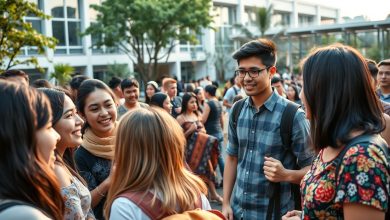How to Get a Cultural Exchange Scholarship and Make the Most of It
For Nigerian learners aiming to expand their horizons, international education programs offer unparalleled growth. These initiatives connect ambitious individuals with global networks while covering costs for academic pursuits abroad. Government agencies, universities, and private groups worldwide fund these programs to nurture future leaders.
Competition for financial support remains fierce, but strategic planning improves success rates. Applicants must research eligibility criteria early and tailor submissions to highlight unique strengths. Many programs prioritize candidates who demonstrate adaptability and clear goals for their overseas experience.
Preparation matters: Building language skills and understanding host-country customs strengthens applications. Students should explore options through platforms like EducationUSA Nigeria or the British Council. Deadlines vary by program, so maintaining an organized timeline prevents missed chances.
Winning an award opens doors to career-building networks and intercultural skills. Recipients gain exposure to new teaching methods while representing Nigeria on global stages. These experiences often lead to lasting professional relationships and enhanced employability in competitive fields.
Introduction: Unlocking Opportunities with Cultural Exchange Scholarships
Substantial financial aid for international studies goes unclaimed annually, waiting for proactive applicants. Research shows thousands of dollars remain untouched because learners don’t submit requests. This gap between available funds and actual recipients highlights a critical opportunity for Nigerian students ready to explore global learning paths.
Three primary sources offer these awards: study abroad providers, independent organizations, and university offices. Many students focus only on well-known programs, missing smaller grants with simpler requirements. Checking all channels increases chances of securing support for tuition, housing, or travel costs.
The benefits extend beyond money. Recipients gain world perspectives through immersive experiences, from language practice to professional networking. These programs often lead to mentorship opportunities and internships that shape career trajectories.
Nigerian applicants should start by contacting their institution’s international office. Regular deadline reminders and tailored application strategies help avoid last-minute hurdles. With proper research, even niche awards become accessible tools for academic advancement.
Understanding Cultural Exchange Scholarships
Navigating global education funding requires understanding diverse financial support options. Five primary categories help learners identify opportunities:
- Program-linked awards tied to specific universities or courses
- Merit-based recognition for academic excellence
- Financial need assistance for qualifying candidates
- Government-sponsored initiatives promoting global collaboration
- Institutional grants from universities supporting overseas study
Program-linked awards often simplify applications since they’re bundled with course enrollment. These typically prioritize candidates facing economic barriers. Example: A Lagos student joining a U.S. summer course might automatically qualify for reduced tuition.
Merit-based opportunities reward standout academic performance or leadership. Nigerian applicants should highlight achievements like science fair wins or community projects. Government initiatives frequently cover full costs but demand detailed proposals showing how the experience benefits local communities.
University grants work best for those already enrolled in degree programs. Many Nigerian institutions partner with foreign schools to offset travel or accommodation expenses. Always check application portals monthly—new opportunities emerge constantly.
Exploring U.S. Department State and Government Exchange Programs
Global education pathways gain momentum through structured initiatives backed by the U.S. Department of State. Their Bureau of Educational and Cultural Affairs designs opportunities that bridge academic goals with international collaboration. Nigerian applicants often find tailored options here, though eligibility varies by initiative.
Featured Programs and Eligibility Criteria
The Community College Initiative stands out for skill-building in technical fields. Open to applicants from select nations, it develops leadership through hands-on training. Another key offering, the Edmund S. Muskie Fellowship, supports graduate studies for emerging professionals in law and public policy.
Key requirements across these government programs include:
- Valid citizenship documentation
- Minimum 3.0 GPA for academic tracks
- Proof of English proficiency (TOEFL/IELTS)
Insights from the Benjamin A. Gilman and Fulbright Programs
While Gilman targets U.S. undergraduates, its framework inspires similar opportunities abroad. The Fulbright Foreign Student Program directly engages Nigerian scholars, offering full funding for advanced research. Pro tip: Alumni networks often help applicants refine their project proposals.
Deadlines for these United States initiatives cluster between October and February. Early preparation allows time to secure recommendation letters and align study plans with program objectives. Regular updates through official channels prevent missed application windows.
Eligibility and Application Essentials
Meeting program criteria forms the foundation of successful funding requests. Nigerian candidates must balance academic performance with clear financial documentation to stand out. Three core elements shape most selection processes: academic benchmarks, economic need proofs, and submission quality.
Academic and Financial Requirements
Programs typically set clear GPA thresholds ranging from 2.5 to 3.0. Competitive awards often demand higher scores or specific course enrollments. Financial assessments require bank statements, tax records, or sponsorship letters to confirm need.
| Requirement Type | Common Details | Documents Needed |
|---|---|---|
| Academic | Minimum 2.5 GPA | Official transcripts |
| Financial | Income verification | Bank statements, tax forms |
| Program-Specific | Enrollment proof | Admission letter |
Crafting Strong Submissions
Early preparation prevents last-minute errors. Follow these steps:
- Gather recommendation letters 6 weeks before deadlines
- Tailor essays to each program’s objectives
- Verify document formatting rules
Application windows often close 4-6 months before programs start. Nigerian students should track multiple deadlines using digital calendars. Key tip: Save submission receipts and follow up within two weeks.
Navigating Fully Funded and Merit-Based Scholarship Programs
Global learning initiatives increasingly prioritize accessibility through comprehensive funding packages. Leading providers structure awards to remove financial barriers while rewarding exceptional candidates. This approach creates diverse pathways for Nigerian students seeking international academic experiences.
Program-Specific Funding Solutions
The School for International Training (SIT) offers automatic consideration for need-based support ranging from $500 to $5,000. Unlike many competitors, SIT extends eligibility to all admitted students regardless of nationality. This model helps participants offset costs for housing, meals, and local transportation.
IES Abroad distributes over $6 million annually through its High-Impact Aid Commitment. Their system analyzes financial need alongside academic potential, with some awards covering 50-100% of program fees. Nigerian applicants should note that 70% of CISabroad participants receive assistance, often within weeks of acceptance.
| Provider | Award Range | Key Features |
|---|---|---|
| SIT Study Abroad | $500-$5,000 | Automatic consideration for all students |
| IES Abroad | Up to $10,000 | Need-based & merit combinations |
| Global Experiences | $500-$10,000 | Priority for underrepresented groups |
Merit-based options like Chevening Scholarships demonstrate how excellence opens doors. These fully funded opportunities assess leadership history and community impact alongside academic records. The Australia Awards take similar approaches, often covering flights, insurance, and monthly stipends.
Strategic applicants maximize success by targeting multiple providers. Many organizations use rolling deadlines, with early submissions receiving priority. Always verify country-specific requirements through official portals before applying.
Scholarships for Different Education Levels and Fields
Academic journeys require tailored support at every stage. Global programs now offer specialized funding matching learners’ academic phases and career paths. From teenagers to doctoral candidates, structured opportunities help Nigerian students access world-class training.
High school aspirants gain early exposure through initiatives like the Future Leaders Exchange. This immersive program places learners in American host families while covering academic costs. Tech-focused options like TechGirls prepare young women for STEM careers through hands-on workshops.
Undergraduate students access semester-long programs through the Global Undergraduate Exchange. Participants study at U.S. colleges while developing leadership skills. Key benefit: Many recipients qualify for automatic consideration in graduate-level awards later.
Graduate students pursue advanced training through the Hubert H. Humphrey Fellowship. This non-degree program sharpens professional skills for mid-career experts. Those pursuing master’s degrees find robust support through the Swedish Institute Scholarships, which cover living costs and tuition.
Field-specific programs target growing industries. The Generation Google Scholarship assists computer science majors, while health-focused awards like the Fogarty Fellowship support medical researchers. These opportunities demonstrate how higher education funding adapts to market demands and student needs.
Programs Tailored for International and Nigerian Students
Global learning initiatives recognize the unique potential of Nigerian scholars. The Community College Initiative Program opens doors for participants from 12 countries, including four African nations. Students from Ghana, Kenya, and South Africa gain technical training at U.S. community colleges while building English proficiency.
Nigerian applicants benefit from opportunities that welcome all nationalities. The SIT Study Abroad program offers automatic funding consideration for students worldwide. IES Abroad similarly prioritizes accessibility, with 70% of applicants receiving partial or full support.
Regional Opportunities and Support Structures
The Mandela Washington Fellowship stands out for young leaders across sub-Saharan Africa. This program combines academic coursework with leadership development, focusing on community impact. Participants return home equipped to drive progress in their local regions.
| Program | Eligible Countries | Key Benefits |
|---|---|---|
| Community College Initiative | 12 nations including Ghana, Kenya | Technical skills + English training |
| SIT Study Abroad | All nationalities | Automatic funding review |
| Mandela Washington Fellowship | Sub-Saharan Africa | Leadership development |
Special pathways exist for students considering community college routes. These programs emphasize practical skills that align with Nigeria’s growing tech and healthcare sectors. Many include internship components with U.S. employers.
Nigerian applicants should note three critical factors:
- Visa processing timelines often exceed standard estimates
- Cultural orientation sessions ease transition challenges
- Flexible program structures accommodate diverse academic backgrounds
Regional initiatives like the West Africa Partnership Scholarship provide targeted support. These opportunities help students maintain home country connections while gaining global perspectives.
Tips for a Winning Scholarship Application
Building a standout application demands precision and storytelling finesse. Successful candidates treat each component as interconnected pieces that reveal their potential. Three elements often determine outcomes: authenticity in narratives, alignment with program goals, and error-free documentation.
Crafting a Compelling Personal Statement
The essay acts as a student’s voice beyond test scores. Start with vivid examples showing problem-solving skills or leadership moments. Example: A Lagos applicant described mentoring peers through coding workshops before linking this to global tech ambitions.
Recommendation letters gain strength when writers detail specific achievements. Professors or employers should highlight traits like resilience during academic challenges. Nigerian applicants benefit from referees who contextualize achievements within local educational landscapes.
Financial proofs require meticulous organization. Bank statements and tax forms must match amounts listed in application forms. Double-check deadlines—many programs reject late submissions regardless of quality. Finalize materials two weeks early to allow time for unexpected revisions.
FAQ
What programs does the U.S. Department of State offer for international learners?
How can applicants demonstrate financial need for merit-based awards?
Are there fully funded options for short-term study in the United States?
What makes Nigerian applicants stand out in selection processes?
Can graduate students apply for government-sponsored initiatives?
How important are language skills for U.S.-based programs?
What deadlines do applicants need to track for fall enrollment?
Published on: 4 de August de 2025






